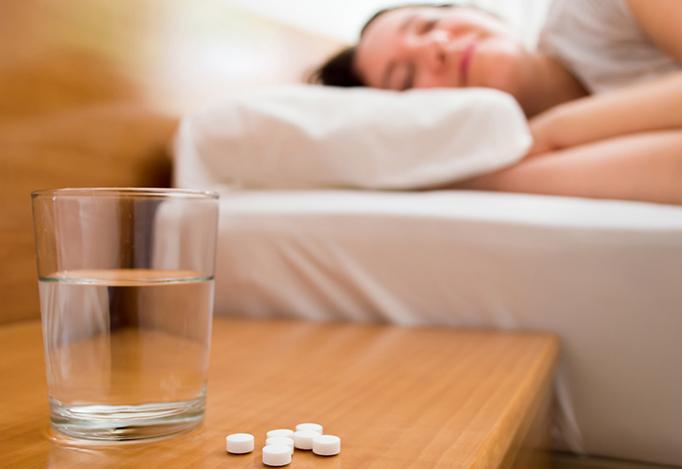Melatonin supplements, advertised for their aid in inducing sleep, have soared in popularity in the last decade. According to the National Center for Complementary and Integrative Health (NCCIH), melatonin use among adults in the United States has more than doubled between 2007 and 2012 and in 2017, 1.3 percent of U.S. adults (3.1 million adults) reportedly used melatonin pills to help them fall asleep. Available in many health food stores, melatonin supplements are sold in pill form, liquid form and in tablets that dissolve underneath the tongue.
Melatonin is a naturally occurring hormone that regulates the body’s sleep-wake cycles. Produced in the brain’s pineal gland, located just above the middle of the brain, melatonin is actively produced when the body is in darkness. It is then released into the bloodstream, causing the melatonin levels in the blood to rise sharply, thus making the body feel less alert and ready for sleep. These levels stay elevated for approximately 12 hours, and daytime melatonin levels are barely detectable. This is due to one’s exposure to bright light –– both sunlight and artificial indoor lighting –– which inhibits the release of melatonin.
Problems falling and/or staying asleep are often due to long exposure to the bright light that inhibits melatonin release. Common examples of that include staring at laptop or smartphone screens late into the night. This has caused many people to turn to melatonin supplements to help their body fall asleep faster and have more restful sleep throughout the night, but does it really help?
According to the National Sleep Foundation, research indicates that taking melatonin supplements does improve sleep when taken to adjust the body’s internal clock for situations such as jet lag or shift work, but when tests were conducted comparing melatonin supplements (“sleeping pills”) to a sugar-pill placebo, most studies could not determine any added benefit to the test subjects taking melatonin. Other studies indicate that the use of melatonin can possibly shorten the time it takes to fall asleep by an average of 12 minutes and it can reduce the number of awakenings throughout the night. However, it does not necessarily improve the total sleep time in test subjects.
There have been little to no recorded side effects of melatonin and there have not been any reported cases of proven toxicity or overdose, so the health risks of taking this supplement are very low. Because melatonin naturally occurs in some foods such as sweet corn, asparagus and pomegranates, it is not categorized as a drug and therefore the factories that produce synthetic melatonin are not regulated as strictly by the Food and Drug Association (FDA). It is the only hormone available in the U.S. without a prescription and can easily be bought at typical dosages of one to three milligrams that cause melatonin levels to raise to one to 20 times the normal amount found in the blood.
Many sleep experts recommend melatonin to help aid in falling asleep, though it does not provide a long-term solution. “If melatonin for sleep isn’t helping after a week or two, stop using it,” said Johns Hopkins sleep expert Luis F. Buenaver. “And if your sleep problems continue, talk with your healthcare provider. If melatonin does seem to help, it’s safe for most people to take nightly for one to two months. After that, stop and see how your sleep is,” he suggests. “Be sure you’re also relaxing before bed, keeping the lights low and sleeping in a cool, dark, comfortable bedroom for optimal results.”
Many Wellesley students have also tested the benefits of taking melatonin supplements. To help her fall asleep, Juliana Tedeschi ’21 told The Wellesley News she has used melatonin supplements to help her sleep a “handful of times” in the last two months. She is comfortable using melatonin supplements because they are a more natural way to help her fall asleep since melatonin is already naturally occuring in her body, unlike other sleep-inducing drugs. However, it eventually “stopped working” for her and often made her drowsier but still she was unable to fall asleep while taking the supplement.
Overall, there is little information about the long-term effects of melatonin, but it is safe to take for short-term aid in falling asleep. By boosting the naturally occurring hormones in the body, melatonin offers relief to millions of people who struggle with insomnia.




